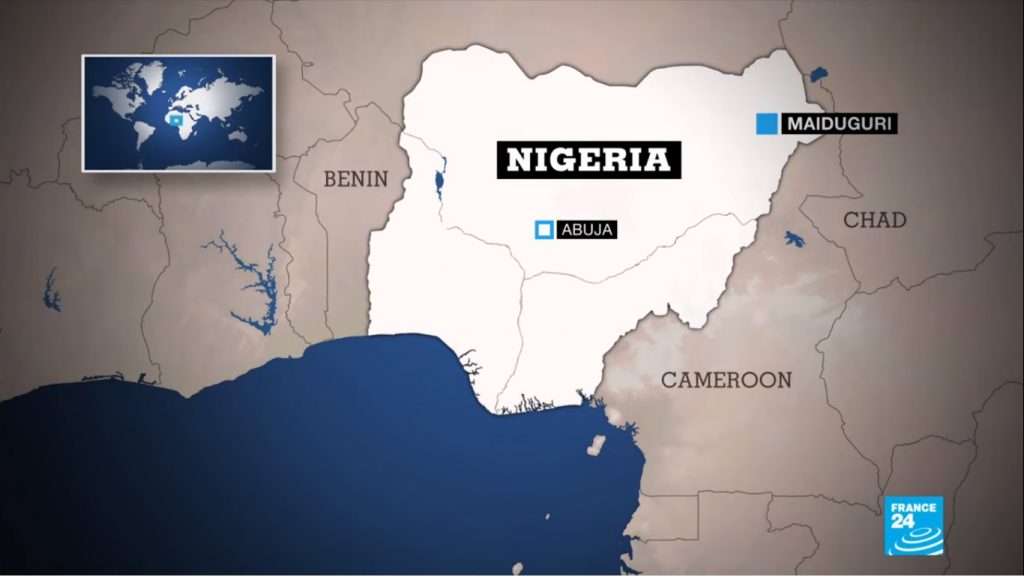Summary: At least 110 farm workers have been killed in northeast Nigeria which the authorities blame on the Islamic Jihadi organisations Boko Haram and IS-affiliated ISWAP. UN says that this was the deadliest attack on civilians this year by the Jihadi group.
The United Nations on Monday stated that 110 farmers had been killed by suspected Boko Haram insurgents in Zabarmari community, Borno State. Locals blamed the attack on Boko Haram fighters, but Bulama Bukarti, an analyst with the Tony Blair Institute, said the rival IS-affiliated Islamic State West Africa Province (ISWAP) were more active in the area. The UN says that both groups have been active in Borno State and their attacks had forced the postponement of local elections in the state which finally took place on Saturday.
The massacre was centred on the village of Koshobe near the Borno state capital Maiduguri, with assailants targeting farm workers harvesting rice fields. One pro-government anti-jihadist militia said the assailants tied up the labourers and slit their throats. UN representatives say that “armed men on motorcycles” also targeted other communities in the area. The terrorists also torched the rice farms before leaving.

In response to the attack, President Mohammadu Buhari said he had directed the nation’s Armed Forces to take the anti-terrorism fight to the insurgents. “The entire country has been wounded by these senseless killings”, he said. The attack took place the same day as long-delayed local elections in the state. The Borno state has been gripped by a jihadist insurgency for more than 10 years.
Farmers have previously been attacked by militants of the Islamist group Boko Haram, who suspect them of passing on information to the military. Last month, Boko Haram fighters killed 22 farmers working on irrigation fields in two separate attacks.
The Nigerian government has repeatedly claimed that the Islamist militant groups have been technically defeated but attacks have continued on local communities and on Nigerian soldiers.
The governor of Borno state, Babagana Zulum, attended the victims’ funerals on Sunday. The government has said that the victims included farm workers and labourers from Sokoto state in northwestern Nigeria, roughly 1,000 kilometres (600 miles) away, who had travelled to the northeast to find work, it said.
Jihadi Violence in Nigeria
Both Boko Haram and ISWAP have been targeting villagers and local residents who they accuse of being informers for the Nigeria security forces and government. These organisation have been blamed for increasing attacks on loggers, farmers and fishermen whom they accuse of spying for the army and pro-government militia.
They have also targeted them for failing to pay a tax they impose on anyone economically active in some parts of the state. Last month Boko Haram militants slaughtered 22 farmers working on their irrigation fields near Maiduguri, in two separate attacks.
But some villagers have begun to resist the extortion. They have also started to retaliate and a few days ago had arrested and disarmed a Boko Haram terrorist. The recent killings are a message to the villagers to not resist their demands or come in their way, say government officials.
Boko Haram has carried out mass abductions including the kidnapping of 276 schoolgirls from Chibok in April 2014. UN observers say that corruption in the security services and human rights abuses committed by them have hampered efforts to counter the unrest.
At least 36,000 people have been killed in the jihadist conflict, which has forced around two million people to flee their homes since 2009. The violence has also spread into neighbouring Niger, Chad and Cameroon, prompting a regional military coalition to fight the militants.
In March 2015, Boko Haram’s leader Abubakar Shekau pledged allegiance to the Islamic State of Iraq and the Levant, rebranding as Islamic State in West Africa. However, authorities believe that many members of Boko Haram operate on their own using their earlier name.
In September 2015, the Director of Information at the Defence Headquarters of Nigeria announced that all Boko Haram camps had been destroyed. However, after a brief lull, the Jihadi organisation regrouped and continued the attacks. Since then, the terrorist attack have resulted in the deaths of thousands of Nigerians and both Boko Haram and ISWAP remain major threats to peace in the region.
